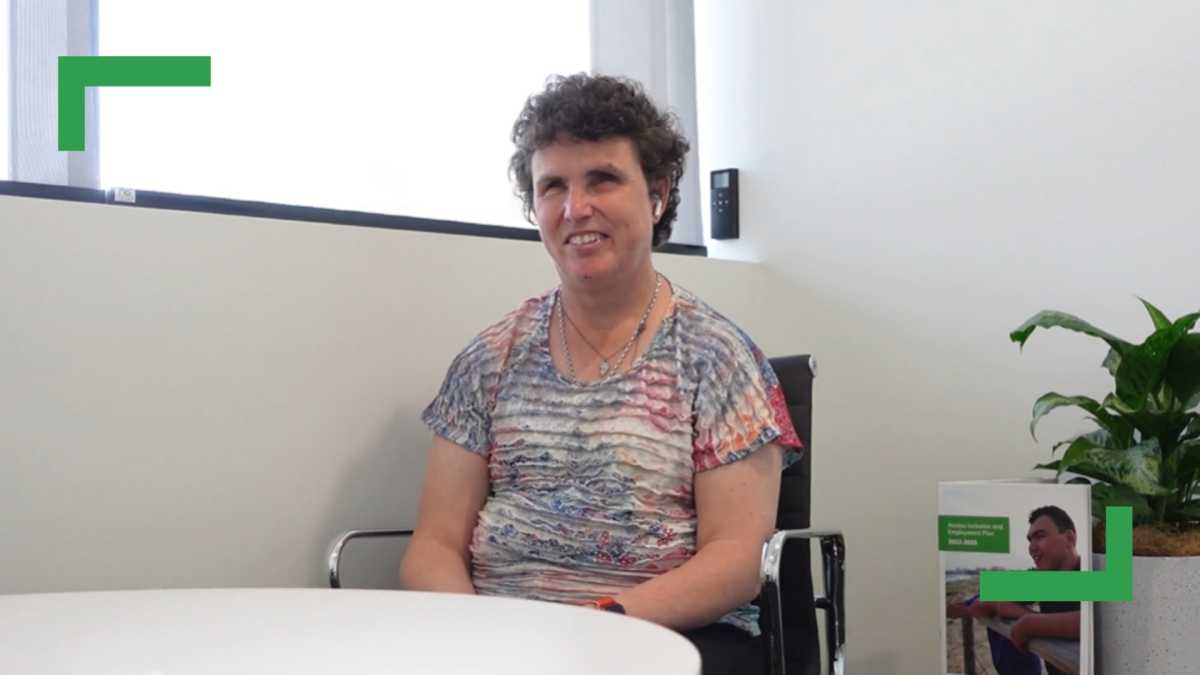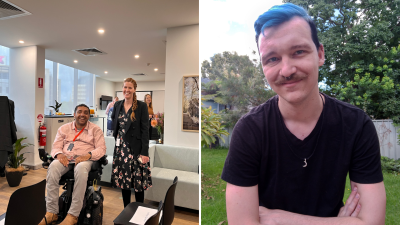Emma Bennison, Manager of Strategic Engagement Disability Employment, at Life Without Barriers.

Emma shares this story with us for International Day of People with Disability. It is written in her own words.
Recently, I attended a senior leadership training program where I had the pleasure of meeting some talented and fascinating professionals. We enjoyed insightful conversations, challenged each other and laughed a lot.
It was also where I had the displeasure of being confronted by a facilitator who thought it was appropriate to make jokes about my disability in front of the group.
This was, mind you, after he had just received a less-than-enthusiastic response from me when he tried out his jokes in private beforehand.
Sadly, it's not uncommon for me and my disabled brothers and sisters to encounter this kind of behaviour from well-meaning, but poorly educated people, (usually professionals who should know better).
On this occasion though, the jokes were particularly average, and what's more, I could hear that his efforts at humour were making my fellow students very uncomfortable.
Sadly, we people with disability get very used to dealing with these kinds of behaviours.
After sharing some constructive feedback with the course coordinator, I did my best to move on.
The next morning, I was shocked to learn that several of my colleagues had confronted the facilitator during morning tea about his behaviour.
They let him know that his jokes were inappropriate, had made them uncomfortable and weren’t appreciated given, as they said, they had come to respect me for my unique insights and perspectives as a former CEO and as a board director.
Not only did their willingness to stand up for me make me feel seen and supported, but they also taught me some valuable lessons which I feel particularly compelled to share with you.
First, it reminded me how entrenched unconscious bias is, particularly in the context of business. Because this facilitator and experienced leader had seemingly made several incorrect assumptions about my professional credentials. This became obvious when he appeared surprised when I answered several questions correctly during the session.
Second, it reminded me that many people are still frightened of interacting with people with disability, or anyone who is perceived to be different. This remains a significant barrier to us being taken seriously as employees, executives and board directors.
You may think I'm being kind to characterise this facilitator's poor-taste humour as a manifestation of fear. In my experience though, humour is often used to mask discomfort. I choose to believe that in this case, the fear might well have been symptomatic of his strong desire to assist me in my learning and his uncertainty as to how to go about it.
Finally, and perhaps most importantly, the incident filled me with hope for the future. It reminded me that even in the space of a few days, it is possible to positively influence attitudes.
Their willingness to challenge makes me hopeful that as future directors and executives, they will feel less fearful of interacting with people with disability and that as a result, they will influence their organisations to be more accessible and inclusive.
Thankfully, most readers weren't with my colleagues and I to share this unfortunate experience. Nevertheless, you too can learn from it. You could take some time to reflect on how interacting with people who are different from you makes you feel.
If it scares you, that's OK.
Being frightened or uncomfortable doesn't make you a terrible person, it makes you a human being. It's also curable, particularly if you challenge yourself to connect with us, listen to our stories and get to know us.
Social media is one way of doing so. Another is reaching out to your customer base, one in five of whom will be a person with disability, whether or not their impairment is visible to you.
You could also leave your unconscious bias, (yes, we all have it, even people with disability), at the door and recruit us as employees, to your boards and to your management teams.
The Australian Human Rights Commission recently released some helpful guidelines on recruiting people with disability which are a great place to start.
And you could follow the example of my fellow kind, insightful and courageous students by not walking past behaviour that diminishes and disempowers others.
If you're wondering why you should care, the answer is simple.
A recent survey published in The Guardian informed us that almost 50% of hiring managers surveyed had never employed a person with disability. With the current worker shortage upon us and given that 20% of Australians are people with disability, that's something all of us should be committed to changing.
I challenge you to take action, so businesses and the broader community can benefit from our skills and talents.
Not because it’s the right thing to do, but because it’s the smart thing to do.
We are, after all, excellent problem solvers who bring unique perspectives and understand the needs of your customers, particularly those with disability.
There is no doubt that those of us with disability will have more experiences like the one I had recently.
That’s why non-disabled leaders need to appoint us to leadership roles, particularly within organisations that exist to serve us. That way, there will be more of us to call out inappropriate behaviour, to educate, to confront bias and hopefully, to tell better jokes.


